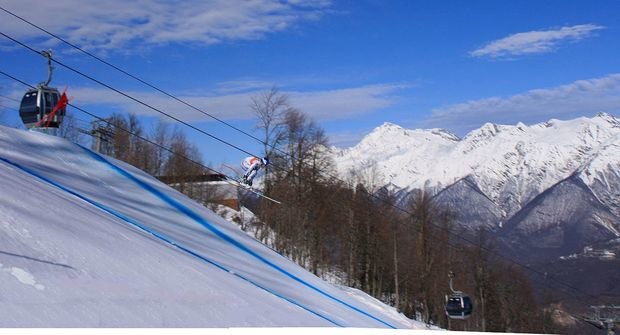''Alpine skiing isn’t our national sport, definitely not''
Roza Khutor is full of weekend skiers, but the tourist flow may dry up in a few years
At the beginning of the month, Russia's largest ski resort Roza Khutor hosted its first World Cup event since 2012. The resort is rather popular as a domestic tourist destination: people come to see the Olympic sites and then try alpine skiing. Nonetheless, this Olympic sport and related events do not attract huge interest around the country.
Russia's ski tourism boom doesn't translate to a love of racing, says The Associated Press. Rosa Khutor, a ski resort an hour away from Sochi, was built as part of Russia's $50-billion sports and infrastructure spend around the 2014 Olympics. The resort's Deputy CEO Aleksandr Belokobylsky claims that 920,000 people visited Rosa Khutor last winter. He expects the number of visitors to increase by 5-10% this season.
Almost all last year's tourists were from Russia. Head of Russia's Association of Tour Operators Maya Lomidze describes typical Sochi skiers as ''government officials, businessmen, employees of big companies'', often from faraway Moscow. She considers that the demand is likely to stay high for at least two or three years. ''After that, they'll need to get creative, to shake things up because people could get sick of it and want something new,'' says Lomidze, adding that Sochi could face hard times if the upper middle class gets bored of its new hobby.
Rosa Khutor has a strong family focus, and many of last week's skiers on its slopes were children, as heavy snowfall left good conditions for novices. The resort's management hopes that these children will return with their own families in a few decades.

Despite the recent ski tourism boom, Russians are barely interested in the sport itself. ''Alpine skiing isn't our national sport, definitely not,'' considers Belokobylsky. ''We've got hockey, that's ours, but not alpine skiing just yet''. Thus, the World Cup skiing event hosted by Roza Khutor at the beginning of March got almost zero media coverage in Russia. Most airtime was taken up with soccer, cross-country skiing world championships, where Russia is a major power, and the 2019 Winter World University Games in Siberia. At the place, many people also had no idea about the event.
''If you don't have good results from [professional] athletes, then there's no huge interest in that event around the country,'' considers Belokobylsky. Russia funds the national alpine skiing team, but it is not a priority due to the team's modest results. Roza Khutor offers programmes for talented local kids, but the country is still far from a new generation of future professional racers. ''We can't tell [...] we're targeting world championship medals with a hundred per cent certainty,'' says the national team's coach Anastasiya Popkova. However, ''we have the resources and we can use Olympic facilities, and we have to use them'', believes the coach.